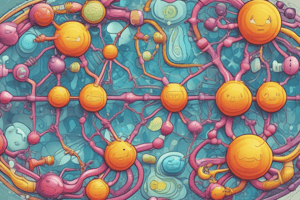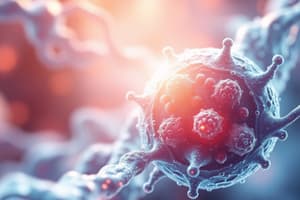Podcast
Questions and Answers
What is the primary substance in which metabolic reactions occur in cells?
What is the primary substance in which metabolic reactions occur in cells?
Protoplasm.
What happens when the metabolic reactions in protoplasm become disorganized?
What happens when the metabolic reactions in protoplasm become disorganized?
Illness or death may occur.
How did biochemistry emerge as an independent discipline?
How did biochemistry emerge as an independent discipline?
It emerged in the second half of the twentieth century as an offshoot of physiology.
Name two medical sciences that have benefited from advancements in biochemistry.
Name two medical sciences that have benefited from advancements in biochemistry.
What role do optimum amounts and combinations of elements play in the context of life?
What role do optimum amounts and combinations of elements play in the context of life?
Why can biochemistry be considered a dynamic science in the 21st century?
Why can biochemistry be considered a dynamic science in the 21st century?
What is one of the major contributions of biochemistry to medicine?
What is one of the major contributions of biochemistry to medicine?
In what way has biochemistry influenced the approach to medicine?
In what way has biochemistry influenced the approach to medicine?
What does the poet's illustration in the content suggest about life?
What does the poet's illustration in the content suggest about life?
How has the evolution of biochemistry impacted the understanding of physiological processes?
How has the evolution of biochemistry impacted the understanding of physiological processes?
Flashcards are hidden until you start studying
Study Notes
Introduction to Biochemistry
- Biochemistry focuses on chemical and metabolic processes occurring in tissue cells.
- Metabolic reactions take place in protoplasm, essential for all life forms.
- Organized metabolic reactions are crucial for health; disorganization can lead to illness or death.
- All elements of living organisms are inanimate when alone but become life-generating when in optimal conditions and combinations.
Development of Biochemistry
- Biochemistry is a relatively young science compared to other biological fields.
- The discipline evolved after advancements in inorganic, organic, and physical chemistry.
- Emerged in the second half of the 20th century as an independent field from physiology.
- Currently one of the fastest-developing sciences, with expanding boundaries.
Impact on Medical Sciences
- Advancements in biochemistry have clarified many previously mysterious physiological processes.
- Influences multiple medical fields, including physiology, pharmacology, bacteriology, pathology, and therapeutics.
- Supports significant medical advancements and enhances medicine's progress.
Role of Biochemists
- Biochemists provide techniques and expertise to address clinical issues.
- Biochemical research can directly inform treatment options for various conditions.
- Discovery of biochemical deficiencies in diseases like rickets, pellagra, beriberi, scurvy, and pernicious anemia has led to effective therapies.
Contributions to Medicine
- Biochemists produce vitamins and hormones in pure forms and assist in vaccine development.
- They work on enzyme inhibitors, recombinant DNA technology, genetic engineering, gene mapping, DNA profiling, and cloning.
- Develop numerous chemical tests that aid in the diagnosis of diseases.
Studying That Suits You
Use AI to generate personalized quizzes and flashcards to suit your learning preferences.



